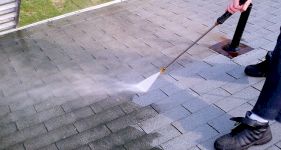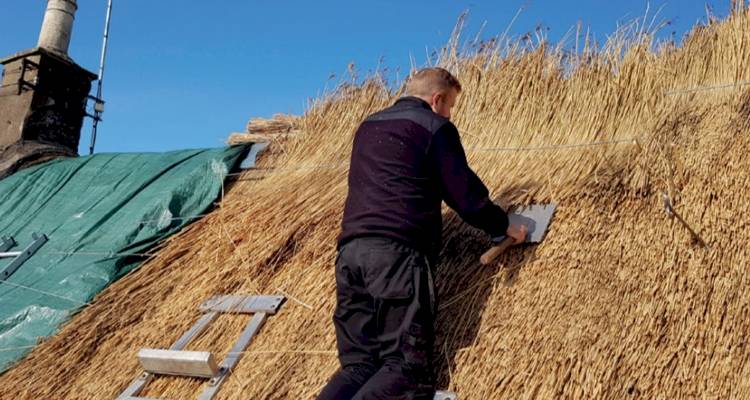Soundproofing a Room Cost
- The average cost of soundproofing a room is around £2,000
- The job will usually take between 2 - 4 days
- A full breakdown of pricing information, including the types of soundproofing available and what such a task typically involves
- How long the job will typically take and a general overview of what types of jobs can be performed
- How to find and hire a soundproof installation expert
Want to find out how much soundproofing a room costs?
We've created this price guide to break down all the costs included in installing sound proof insulation.
On average, you're looking at an overall cost of around £2000 for a room soundproofing solution.
We take a look at different types of soundproofing such as sound proof foam, sound proof plasterboard, soundproof flooring and more!
Ready for a quote?
We have a range of soundproofing installation specialists ready to give you a free quote!
Let's get started below...

£2000
Table of Contents
How Much Does it Cost to Soundproof a Room?
Soundproofing is a great way to separate one room from another or to diffuse the noise from neighbouring properties. Reducing noise, or soundproofing is becoming more and more popular amongst homeowners.
Most rooms have many places where noise will leak in, such as the doors, windows and air vents. Sound can even travel in and out of ceiling light fixtures and cracks in the walls.
Along with airborne noise, many homes create structural noises which cause pollution to homeowners. With soundproofing, you can create a beautiful quiet space, free of any irritating disturbances. Soundproofing also means increasing your properties structural mass, making it more difficult for sound waves to travel through it.
To successfully increase the volume of your walls, ceilings or floors, you can use bulkier and denser materials. This, in turn, will reduce or limit the volume of noise heard from neighbouring rooms.
There are many different methods of soundproofing installation and a number of ways to achieve excellent results. Whether you are hoping to create a beautiful home cinema room, absorb sound from your garage band or simply reduce the noise from next-door's house parties.
Soundproofing is a fantastic investment that can add value to your property as well as relieving you of nearby noise pollution. For best results, we always recommend having your soundproofing installed by an experienced tradesperson.
In this article, we will cover everything you need to know before hiring an expert to install soundproofing to your home. When installing soundproofing, it is essential to understand what works, and what doesn't.
Before purchasing your soundproofing materials, you should research the various options and materials on the market for soundproofing. This will allow you to understand all of the different options you have to achieve the best result for your needs.
Alternatively, you can contact your tradesperson of choice to ask for their advice on which soundproofing method would work best for you. Each professional will have their preferred mode of installation, so be sure to ask before hiring them for the job.
The cost of having a professional soundproofing installation in the UK will on average cost around £2,000 for an average-sized room. Of course, this price can change dramatically depending on the size of your area.
Expert tradespeople may charge anywhere from £300-£500 labour per day, depending on the scale and difficulty of your soundproofing project. As we mentioned, there are many different methods available for installing soundproofing within your property.
Depending on the method you choose, the charges will vary. For example, the price of installing wall soundproofing compared to timber joist ceiling soundproofing is usually a dramatic difference, with ceiling soundproofing costing more.
Soundproofing may also be used to absorb noise created from sound reverberation, reducing echoing in more significant scaled properties. If you are unsure as to which method would work best for you, a professional tradesperson will be happy to assess your situation and offer expert advice accordingly.
What's the best solution for soundproofing floors - matting or insulation? We want to reduce noise between upstairs and downstairs and have floorboards. We want to keep it simple and affordable.
Soundproofing Room Prices
| Job Description | Duration | Material Cost | Labour Cost |
|---|---|---|---|
| Soundproofing Internal Walls | 2-4 Days | £250 | £300-£500 |
| Soundproofing Ceilings | 2-4 Days | £250-£500 | £300-£500 |
| Soundproofing Floors | 2-4 Days | £300-£600 | £300-£500 |
Things to Consider Before Installing Soundproofing
There is a common factor that many people forget to take into consideration when calculating the cost of soundproofing, and that is your contractor's labour. Though the cost of your materials can vary, the most significant expense is generally acquired when hiring an expert to install the proofing for you.
As we mentioned previously, depending on the scale of the area and difficulty of the installation, your tradesperson may charge upwards of £300 labour per day. The average time for installation usually takes between 2-4 days.
While doing the work yourself is not impossible, we always recommend hiring a contractor for the best results.
However, professional installations do cost more but will also make for a quicker, more efficient completion. One more thing to consider is that not all methods of soundproofing will work for your space.
Thankfully, there are a variety of soundproofing options available. Your contractor will assess your home and individual situation to advise the best solution for you.
The great thing about soundproofing is that there are numerous options available for you to choose from. This means that you have the freedom and flexibility to accommodate your budget and source affordable solutions for you.
Installing Soundproofing Yourself
It is possible to install soundproofing materials to your property yourself. However, for best results, we always advise you to seek the guidance and assistance of a licensed and trained expert.
There are many things to consider before carrying out the installation process yourself, so be sure to educate yourself properly before doing so. As with any home installation, soundproofing can be tricky to install if you are not experienced with doing so.
Ensure you are confident in your own ability before attempting any installation yourself. Always follow the manufacturer's guidelines and be sure to use the correct equipment for the job.
Unsuccessful installations can lead to costly repairs and damages to your property, so never attempt the installation if you are unsure about anything.
For this example, we will be guiding you step-by-step through installing soundproofing foam to an internal wall.
Step 1 - Begin by measuring the area you wish to soundproof and decide on the results you want to achieve. Whether this is to minimise noise from external sources such as neighbours or road traffic, or perhaps you want to confine the sound to one space for a music room or home theatre.
Step 2 - When using soundproofing foam panels, you will need to fix each section to your walls using special adhesive. Always refer to the manufacturer's guidelines to ensure you are using the correct adhesive for your panels.
Step 3 - Clean the surface of your walls with rubbing alcohol or a specialist cleaning solution to ensure the space is free of grease or dirt. This could interfere with the installation process, resulting in your soundproofing panels potentially falling off the wall.
Step 4 - Measure, cut and trim each foam panel to the desired shape and size of your space. For best results, a sharp retractable utility knife provides the best stability and precision for tricky corners and edges.
Step 5 - Apply the adhesive or fixing solution, as stated in the manufacturer's guidelines. The adhesive should be applied to the back of the panel in an even consistency.
Step 6 - Stick the foam panel boards to the surface of your internal walls, holding for a few moments until the adhesive has become tacky. Wait at least 24 hours before attempting to touch the boards, to ensure that the glue has fully set and the pannels are successfully installed.
Soundproofing Checklist
- Decide the result you wish to achieve from installing soundproofing. For example, to reduce the noise produced by neighbours or surrounding rooms.
- Research the various methods of soundproofing available to determine the best method of application for you.
- Contact a professional tradesperson for expert advice or to find a solution for your situation.
- Check that your tradesperson has experience with installing soundproofing materials and ask them to inform you of the previous projects they have worked on.
- Always refer back to the manufacturer's instructions for installation, especially if carrying out the work yourself.
- Be sure to follow the correct aftercare instructions and advice given to you, to maximise the longevity of your soundproofing solutions.









